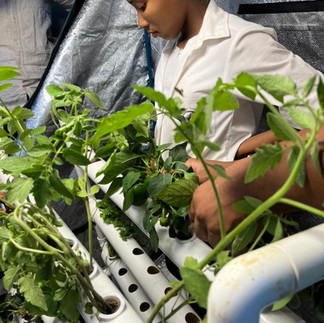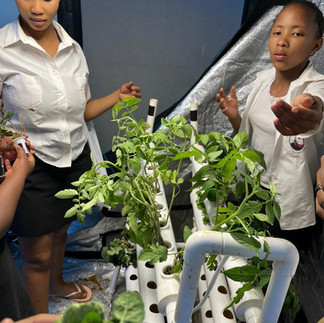Hooray for Hydroponics: Growing Knowledge, Nourishment and Innovation at Naankuse Primary School
- gerhard648
- Nov 7, 2025
- 2 min read
A green revolution is quietly unfolding at Naankuse Primary School, and it is happening without a single handful of soil. The school has stepped confidently into the age of hydroponics, embracing a smarter and more sustainable way of growing food while nurturing curious young minds along the way.
What began as a university research initiative has blossomed into a living and thriving model of innovation, conservation and community empowerment.
Where Innovation Took Root
The hydroponics project first came to life through a partnership between the Namibia University of Science and Technology (NUST) and the Independent Institute of Education Varsity College (IIE). The initiative forms part of the EU funded Smart Energy Solutions for Africa (SESA) project, a programme dedicated to empowering African communities through sustainable technology.
At the centre of this journey is Rikurora Karamata, whose academic path became deeply connected to the future of smart agriculture in Namibia. His honours research focused on designing and implementing a small scale hydroponic system, an academic exercise that soon revealed greater possibilities.
Hydroponics; the soil free method of growing plants using nutrient rich water, holds immense promise in a country where agriculture is challenged by drought, harsh climates and limited arable land. For Rikurora, this was not only research, it was a vision for food security, education and environmental stewardship.
Taking Theory Into the Field
Inspired by the success of the initial work, Rikurora continued his research into his master’s studies, broadening the practical application of the project. To deepen its impact, the team partnered with the Naankuse Foundation, a leader in conservation, community upliftment and sustainable living.
With the support of Naankuse, the hydroponic system was established on their grounds, transforming an academic concept into a hands on and working model. It now serves as both a functional food production system and the core of Rikurora’s field research.
Planting Seeds for the Future
Today, the hydroponics project stands as a meaningful example of what collaboration can achieve. It brings together:
academia and research supporting real world solutions
conservation efforts promoting sustainable practice
communities and learners gaining tools for empowerment and self sufficiency
This initiative is not only producing leafy greens, it is cultivating knowledge, inspiring young learners and laying the foundation for future agricultural innovation in Namibia.
From classroom curiosity to sustainable food production, the hydroponics garden at Naankuse Primary School shows that even small projects can spark big change. As students watch their plants flourish, they are witnessing a future where technology, education and environmental care grow together.


















